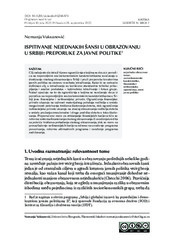Приказ основних података о документу
Ispitivanje nejednakih šansi u obrazovanju u Srbiji: preporuke za javne politike
Examining unequal opportunities in education in Serbia: evidence-based public policy recommendations
| dc.creator | Vuksanović, Nemanja | |
| dc.date.accessioned | 2023-12-27T11:19:55Z | |
| dc.date.available | 2023-12-27T11:19:55Z | |
| dc.date.issued | 2023 | |
| dc.identifier.issn | 2683-5959 | |
| dc.identifier.uri | https://kritika.instifdt.bg.ac.rs/index.php/kc/article/view/147/239 | |
| dc.identifier.uri | http://rifdt.instifdt.bg.ac.rs/123456789/3677 | |
| dc.description.abstract | Cilj rada jeste da istraži tipove ograničenja s kojima se deca iz porodi-ca sa nepovoljnim socioekonomskim karakteristikama suočavaju u dostizanju visokog obrazovanja u Srbiji i pruži preporuke kreatorima javnih politika na osnovu rezultata istraživanja. Kako bi se ostvario definisan cilj, u istraživanju su korišćene standardne tehnike priku-pljanja i analize podataka – kabinetsko istraživanje i fokus grupe. Nalazi upućuju na to da ograničenja s kojima se suočavaju deca iz porodica sa nepovoljnijim socioekonomskim karakteristikama u Sr-biji jesu finansijske i nefinansijske prirode. Ograničenja finansijske prirode ukazuju na važnost materijalnog položaja roditelja u smislu mogućnosti pokrivanja troškova školovanja deteta, dok ograničenja nefinansijske prirode ukazuju na značaj obrazovanja roditelja deteta u smislu pružanja emocionalne i druge podrške detetu u toku školo-vanja. Preporučene mere za otklanjanje finansijskih barijera tiču se reforme sistema finansiranja visokog obrazovanja ili uvođenja kredita za pokriće troškova pohađanja visokog obrazovanja, dok se mere za prevazilaženje nefinansijskih barijera odnose na uvođenje programa povezivanja, reformu afirmativnih programa i uvođenje programa zadržavanja. | sr |
| dc.description.abstract | The aim of the paper is to investigate the types of obstacles that children from fami-lies with unfavourable socioeconomic characteristics face in reaching high education in Serbia and to propose evidence-based public policy recommendations. To achieve the defined goal, standard techniques of data collection and analysis were used in the study–desk research and focus groups.The findings suggest that both financial and non-financial barriers affect children coming from families with less favourable socio-economic features in Serbia. Financial barriers indicate the importance of the parents’ wealth status in terms of the ability to cover the costs of the child’s education, while non-financial barriers indicate the importance of the parents’ emotional and other support to the child during schooling. The recommended measures to remove finan-cial barriers concern the reform of the high education financing system or the intro-duction of a loan system to cover the costs of attending high education, while the measures to overcome non-financial barriers refer to the introduction of bridge pro-grams, the reform of affirmative programs and the introduction of retention programs. | sr |
| dc.language.iso | sr | sr |
| dc.publisher | Beograd : Institut za filozofiju i društvenu teoriju | sr |
| dc.rights | openAccess | sr |
| dc.rights.uri | https://creativecommons.org/licenses/by/4.0/ | |
| dc.source | Kritika: časopis za filozofiju i teoriju društva | sr |
| dc.subject | nejednake obrazovne šanse | sr |
| dc.subject | socioekonomske karakteristike | sr |
| dc.subject | financial and non-financial constraints | sr |
| dc.subject | public policy measures | sr |
| dc.title | Ispitivanje nejednakih šansi u obrazovanju u Srbiji: preporuke za javne politike | sr |
| dc.title | Examining unequal opportunities in education in Serbia: evidence-based public policy recommendations | sr |
| dc.type | article | sr |
| dc.rights.license | BY | sr |
| dc.citation.issue | 2 | |
| dc.citation.volume | 4 | |
| dc.citation.spage | 455 | |
| dc.citation.epage | 476 | |
| dc.identifier.doi | 10.5281/zenodo.10206874 | |
| dc.type.version | publishedVersion | sr |
| dc.identifier.fulltext | http://rifdt.instifdt.bg.ac.rs/bitstream/id/13329/06_Vuksanovic_K_2023-2.pdf |

